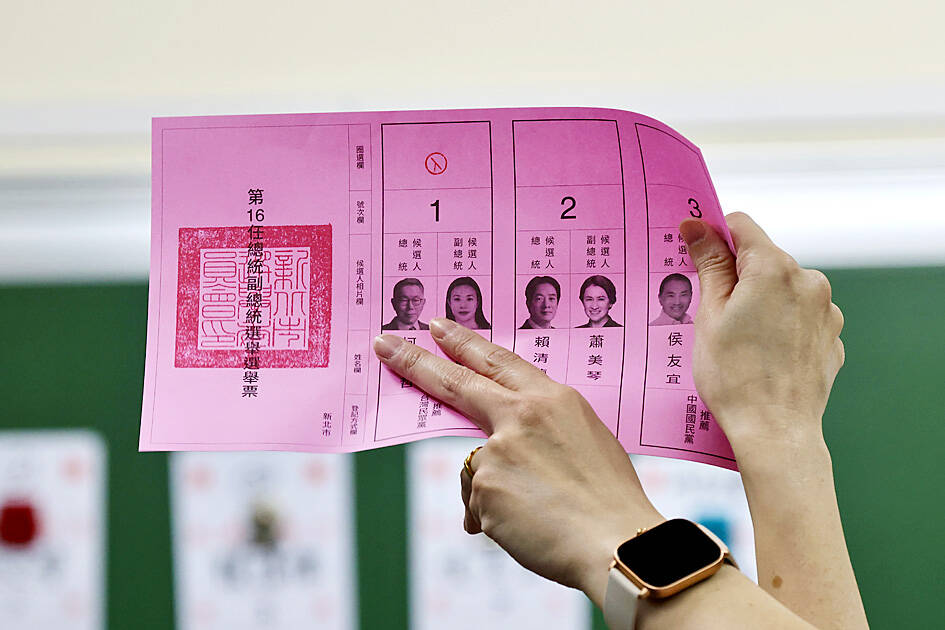The 3.69 million votes garnered by Taiwan People’s Party (TPP) Chairman Ko Wen-je (柯文哲) in Jan. 13’s presidential election reflected the “distrust” felt by many young people toward the country’s two major parties, a Malaysian analyst said.
Tan Seng Keat (陳承傑), research manager at the Malaysia-based Merdeka Center for Opinion Research, said a key takeaway from the outcome of the presidential election was how many young voters supported Ko.
The election results showed that ballots cast by young Taiwanese voters had “flowed to” Ko, Tan said, adding that this signaled “the distrust felt by the young generation toward the two traditional big parties in Taiwan.”

Photo: EPA-EFE
On the other hand, the loss of youth support should raise the alarm for the Democratic Progressive Party (DPP) and the Chinese Nationalist Party (KMT), added Tan, who visited Taiwan for the presidential and legislative elections.
Ko received 3.69 million votes, 26.46 percent of the total, leaving him in third behind Vice President William Lai (賴清德) of the ruling DPP and New Taipei City Mayor Hou You-yi (侯友宜) of the KMT.
Lau Chin Kok (劉振國), a senior member of the Malaysian Chinese Association, a Malaysian political party, made a similar observation after obervering Taiwanese at the polls.
For young people, the TPP has become an alternative to the other two parties because of its “more flexible” campaigning approach, Lau said, adding that the DPP and the KMT had not come up with fresh strategies to appeal to young voters and had relied on traditional methods.
Their comments reflected pre-election polling, which suggested that Ko’s approval rating among voters aged from 20 to 40 was significantly higher than that of Lai and Hou.
Beyond that three candidates naturally diluted each other’s vote count, Tunghai University political scientist Shen Yu-chung (沈有忠) said that Ko won the support of many younger voters who supported Tsai in 2020.
Lai received 5.58 million votes in the presidential election, leaving him well short of the 8.17 million received by President Tsai Ing-wen (蔡英文) four years ago.
National University of Singapore political scientist Ian Chong (莊嘉穎) said that the support garnered by the TPP was a reflection of “dissatisfaction with domestic issues,” such as low wages and high house prices, and “has little to do with the People’s Republic of China.”

Chinese Nationalist Party (KMT) Chairman Eric Chu (朱立倫), spokeswoman Yang Chih-yu (楊智伃) and Legislator Hsieh Lung-chieh (謝龍介) would be summoned by police for questioning for leading an illegal assembly on Thursday evening last week, Minister of the Interior Liu Shyh-fang (劉世芳) said today. The three KMT officials led an assembly outside the Taipei City Prosecutors’ Office, a restricted area where public assembly is not allowed, protesting the questioning of several KMT staff and searches of KMT headquarters and offices in a recall petition forgery case. Chu, Yang and Hsieh are all suspected of contravening the Assembly and Parade Act (集會遊行法) by holding

PRAISE: Japanese visitor Takashi Kubota said the Taiwanese temple architecture images showcased in the AI Art Gallery were the most impressive displays he saw Taiwan does not have an official pavilion at the World Expo in Osaka, Japan, because of its diplomatic predicament, but the government-backed Tech World pavilion is drawing interest with its unique recreations of works by Taiwanese artists. The pavilion features an artificial intelligence (AI)-based art gallery showcasing works of famous Taiwanese artists from the Japanese colonial period using innovative technologies. Among its main simulated displays are Eastern gouache paintings by Chen Chin (陳進), Lin Yu-shan (林玉山) and Kuo Hsueh-hu (郭雪湖), who were the three young Taiwanese painters selected for the East Asian Painting exhibition in 1927. Gouache is a water-based

Taiwan would welcome the return of Honduras as a diplomatic ally if its next president decides to make such a move, Minister of Foreign Affairs Lin Chia-lung (林佳龍) said yesterday. “Of course, we would welcome Honduras if they want to restore diplomatic ties with Taiwan after their elections,” Lin said at a meeting of the legislature’s Foreign Affairs and National Defense Committee, when asked to comment on statements made by two of the three Honduran presidential candidates during the presidential campaign in the Central American country. Taiwan is paying close attention to the region as a whole in the wake of a

OFF-TARGET: More than 30,000 participants were expected to take part in the Games next month, but only 6,550 foreign and 19,400 Taiwanese athletes have registered Taipei city councilors yesterday blasted the organizers of next month’s World Masters Games over sudden timetable and venue changes, which they said have caused thousands of participants to back out of the international sporting event, among other organizational issues. They also cited visa delays and political interference by China as reasons many foreign athletes are requesting refunds for the event, to be held from May 17 to 30. Jointly organized by the Taipei and New Taipei City governments, the games have been rocked by numerous controversies since preparations began in 2020. Taipei City Councilor Lin Yen-feng (林延鳳) said yesterday that new measures by